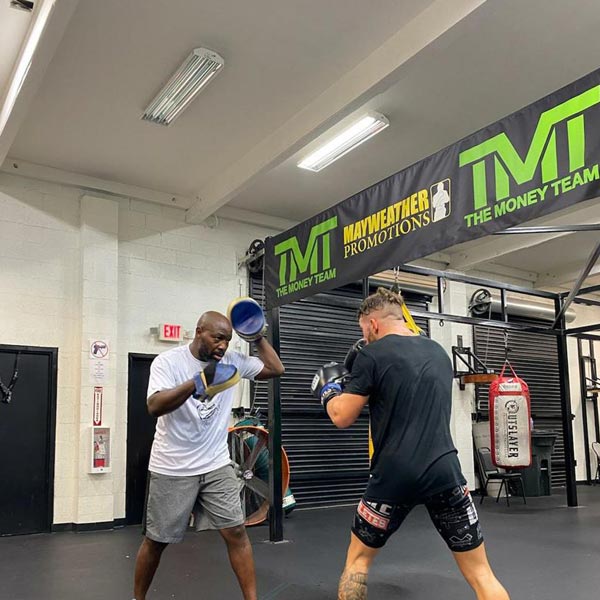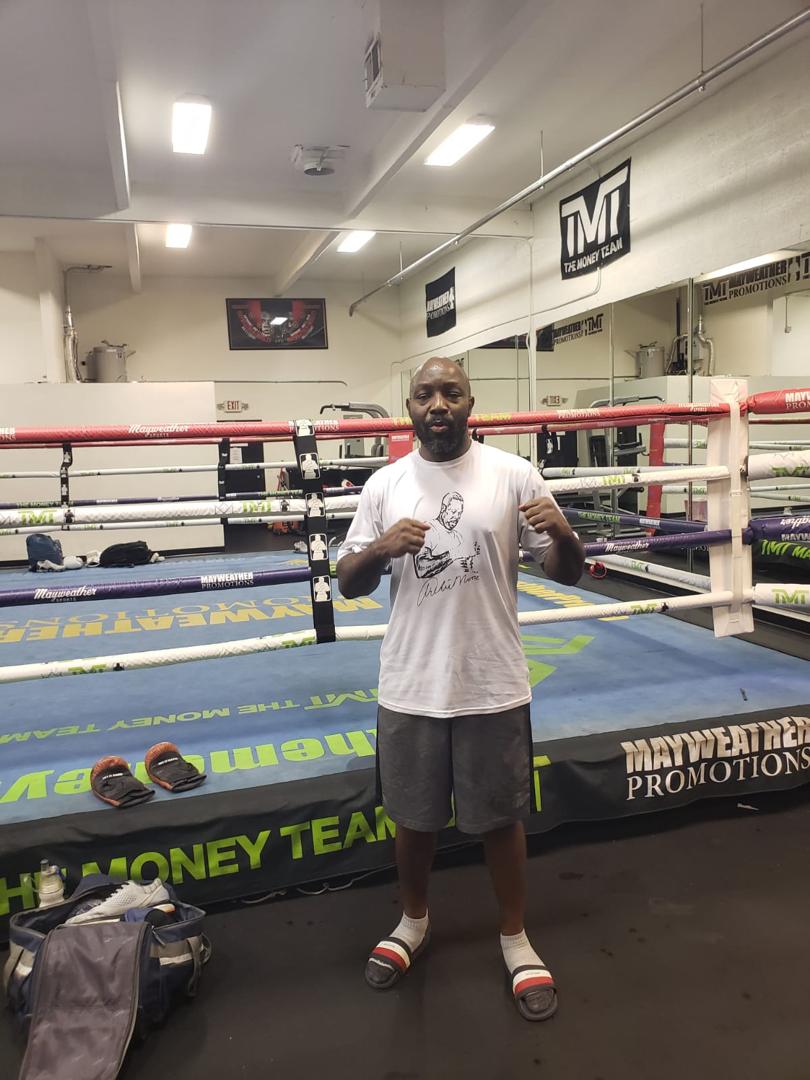A familiar face to Ghana boxing fans can be found barking instructions every day at Mayweather Boxing Club in Las Vegas.
Kofi Jantuah has been training fighters at the renowned gym since he retired in 2009. As one of the finest warriors to emerge from Ghana, Jantuah has much to teach the other boxers.

Yet, like so many Ghanaians abroad, Jantuah’s mind isn’t far from his roots.
“I have a lot of fighters that I train here in Las Vegas but I want to come back home and help with the amateurs,” Jantuah told BoxingAfrica.com. “It is time for me to impart my knowledge in boxing to the next generation of Ghanaian fighters.”
Jantuah, 46, understands the importance of a properly funded and operated amateur boxing program. Perhaps if he himself had an amateur career, he would have won a world title. The proud Ashanti can’t turn back the hands of time but he can, as his fellow Akan would say, Sankofa.
Jantuah’s story began on June 16, 1974, when he was born in Saltpond, Ghana. At age five, he moved to Kumasi to live with his father, Kofi Jantuah Sr.
In Kumasi, Jantuah was raised at Kofrom, a suburb of the capital in the Ashanti Region. He was in high school when an unknown man stopped by his home. What occurred next can only be described as fate.
“A man who claimed to be a friend of my father came around to visit but met his absence,” Jantuah recalled. “My father was in Accra so I decided to see him off. That was when he asked me to consider boxing. I was interested in the whole thing so I gave it a try.”
Jantuah told his father about the man, but Senior had no recollection of such a person. Neither would see the man again.
However, Kofi took his advice, frequenting Baba Yara Sports Stadium in Kumasi to train. Soon it became a daily routine.
“He was like a blessing to my life because I didn’t have any direction at the time,” said Jantuah. “I was contemplating quitting school so boxing gave me another option aside from education.”
At the Stadium, Jantuah met then Ashanti Regional trainer Emmanuel Doku and told him he wanted to be a boxer. Jantuah’s father didn’t know about his son’s newfound passion but would find out soon after.
“My father asked whether I was training as a boxer because his friends saw me at the stadium and told him,” said Jantuah. “He decided to support me in whichever way he could after I opened up to him.”
Jantuah trained for two years. He wanted to make his professional debut but coach Doku disagreed, believing the fighter would be better served pursuing an amateur career first.
“I started training with a different coach after that disagreement because I felt it was time to start fighting,” Jantuah admitted.
“I remember going to Accra with my father to get my boxing license and through the late John Allotei Cofie, I met some promoters.”
Moving to Accra
Jantuah relocated to Accra in 1994 after five professional fights. He then challenged Sam Ankromah for the national super lightweight title.
“I was gaining attention because I was the only Ashanti boxer coming to Accra to win bouts. So many Ashantis in the capital were coming to my fights to support me,” said Jantuah.
“I won against Ankromah on points in a very tough contest. The victory really made me popular because I shocked a lot people.”
Next, Jantuah faced the dreaded Abraham Tetteh for the national welterweight title.
At the time, Tetteh was a respected sparring partner for world welterweight champion Ike Quartey. The association brought more attention to the fight—among other things.
On fight night, Tetteh’s team threw items at Jantuah in the ring. The bout was declared a no-contest.
“I was hurt but I learnt a lot about intimidation tactics and that helped me when I came to America,” said Jantuah.
Meeting Azumah Nelson
Jantuah’s ring exploits caught the eye of the legendary Azumah Nelson, who asked the fighter to join his gym.
There, Jantuah met fighters such as Moro Tijani, Eric Odumase, Sam Ampiah, Isaac Acquah and Theophilus Amuzu.
Jantuah continued his winning ways. In November 1997, he captured the Commonwealth title with an impressive first-round TKO over Australia’s Stefan Scriggins. However, the relationship with Nelson became strained.
“Azumah was not ready to help any on the fighters so I left to go abroad. If I had stayed, I wouldn’t have achieved the little that I did in my career.”
Through Ringcraft Promotions, Jantuah left Ghana for the US in 1998 with two other fighters, Ben Tackie and James “Bukom Fire” Armah. Ringcraft would ultimately manage Jantuah.
The trio lived in Los Angeles and trained under famed Southern California-based trainer Joe Goossen.
Jantuah made his US debut that November with a six-round points win against Emiliano Valdez of Dominican Republic.
Learning The Hard Way
In 1999, a 19-0 Jantuah signed a promotional contract with Don King.
“That was the biggest mistake in my career,” said Jantuah “My managers at Ringcraft Promotions refused but the association with him was huge for me so I agreed.
“I was guaranteed a bonus of $50,000 for signing which I never got. The contract guaranteed me three fights a year but I ended up fighting four times in four years.”
The inactivity stalled his career. In June 2001, Jantuah was stopped by Manuel Gomez in the 10th round. Through the late lawyer Todd Nelson, he was able to part ways with King.
“I got audio and news article evidence of Don King lying to the people in Ghana about my inability to win a world title.
“It was those comments that freed me because the court ruled in my favor after we presented them as evidence.”
Onward Fistic Soldier
Jantuah bounced back with six consecutive victories, winning the WBC International super welterweight title in the process.
In January 2005, he took on IBF world super welterweight champion Kassim Ouma.
“I had the best of preparation for the bout but a stomach upset weakened me on the eve of the fight,” said Jantuah.
“I decided to go in search of a knockout in order to prevent the fight from going the distance. Ouma was smart and preferred to box so I lost on decision.”
Jantuah would win two fights before the end of 2005, leading him to face Arthur Abraham for the IBF world middleweight title.
The fight was slated for May 13, 2006 in Abraham’s native Germany. After 12 rounds, all judges scored a unanimous decision for the German.
“That fight was close but the judges scored it in his favor. I knew I should have knocked him out to win in Germany so I didn’t want to blame anyone,” said Jantuah.
Jantuah continued to fight, producing mixed results. In 2009, “The Pride of Ashanti” hung up the gloves for good, retiring as one of the best African fighters of his era.
Today, Jantuah monitors Ghana boxing from his Las Vegas home. While he lauds recent world champions Isaac Dogboe and Richard Commey, their short title reigns – and the lack of elite Ghanaian fighters overall – concern him.
“Sometimes the foundation of fighters really counts,” says Jantuah. “Fighters of today lack good amateur transition and that is affecting them.
“Azumah Nelson and Ike Quartey had the best of amateur careers before turning professionals and that really helped them.”
As a fighter with no amateur experience, Jantuah can relate.
“Boxing is a serious business which provides a lot of employment opportunities for the youth. The government must invest into the amateur program if we want to produce more credible contenders.”








